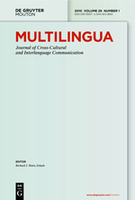
Multilingua-Journal of Cross-Cultural and Interlanguage Communication
Scope & Guideline
Bridging Cultures Through Language and Dialogue
Introduction
Aims and Scopes
- Multilingual Communication:
The journal investigates how individuals navigate communication in multilingual settings, examining both verbal and non-verbal aspects of interaction. - Language Ideologies:
A critical analysis of the beliefs and values surrounding languages, including how ideologies influence language use, policies, and identity formation. - Translanguaging Practices:
Exploring the fluid use of multiple languages in communication, the journal studies how translanguaging functions in educational, social, and professional contexts. - Impact of Globalization on Language:
Research on how globalization affects language practices, including language shift, maintenance, and the emergence of new linguistic norms in multicultural environments. - Language Policy and Planning:
The journal focuses on the implications of language policies in various settings, including education and migration, and their role in fostering linguistic diversity. - Heritage Language Maintenance:
Exploring the challenges and strategies involved in maintaining heritage languages within families and communities, particularly in diasporic contexts.
Trending and Emerging
- Impact of COVID-19 on Language Practices:
Research on how the pandemic has reshaped communication norms, language learning, and family language policies, reflecting urgent societal changes. - Linguistic Diversity and Inclusion:
An increasing focus on the role of language in fostering social inclusion, equity, and representation, particularly in multicultural contexts. - Intersectionality in Language Studies:
Emerging studies that analyze language through the lens of intersectionality, considering how factors like race, gender, and migration status influence language use and identity. - Digital Communication and Social Media:
Exploration of how digital platforms and social media are transforming language practices, including the use of translanguaging and hybrid language forms. - Language and Mental Health:
Research investigating the relationship between language use, cultural identity, and mental health, particularly in marginalized communities.
Declining or Waning
- Traditional Language Teaching Methods:
There has been a decrease in papers focused on conventional language teaching methodologies, as the discourse shifts towards more dynamic and integrative approaches such as translanguaging. - Monolingualism in Education:
Research emphasizing monolingual approaches in educational settings appears to be waning, as the focus increasingly turns towards multilingual and inclusive pedagogical practices. - Static Language Identity Models:
The exploration of fixed or static models of language identity is less prevalent, with contemporary research favoring fluid and intersectional understandings of identity. - Bilingualism as a Deficit Model:
The framing of bilingualism as a challenge or deficit is diminishing, replaced by a more positive view that highlights the benefits of multilingualism and diverse linguistic repertoires. - Linguistic Purism:
The focus on linguistic purism and ideologies that promote a singular standard language is declining, as the journal embraces more pluralistic and inclusive perspectives.
Similar Journals

Yazyk i Kultura-Language and Culture
Connecting Cultures Through Linguistic InquiryYazyk i Kultura - Language and Culture is a distinguished academic journal dedicated to the exploration of linguistic and cultural issues across various contexts. Published by TOMSK STATE UNIVERSITY, this journal serves as a vital resource for researchers, scholars, and students interested in the intricate interplay between language and culture. With an ISSN of 1999-6195 and an E-ISSN of 2311-3235, it engages a global community in disseminating high-quality research articles, reviews, and theoretical discussions. Although the journal is not categorized as Open Access, it ensures that its contents contribute significantly to the academic discourse within the fields of linguistics, cultural studies, and social sciences. With a commitment to promoting scholarly research, Yazyk i Kultura is positioned to shape contemporary conversations about language's role in cultural dynamics, making it an essential outlet for those dedicated to advancing understanding in this interdisciplinary domain.

Eurasian Journal of Applied Linguistics
Elevating Linguistics: Insights for a Global AudienceThe Eurasian Journal of Applied Linguistics, published by Hacettepe University, ELT Department, is a distinguished open-access journal that has been contributing to the fields of linguistics and language education since 2015. With a focus on bridging cultural and linguistic understandings across Eurasia, this journal provides a platform for researchers, educators, and practitioners to share cutting-edge studies, innovative pedagogical strategies, and insightful analyses. The journal holds notable Scopus rankings within the Language and Linguistics (Rank #155/1088, 85th Percentile) and Education (Rank #696/1543, 54th Percentile) categories, evidencing its growing impact within the academic community. As it prepares to converge into a new phase from 2018 to 2024, the Eurasian Journal of Applied Linguistics aims to uphold its mission of fostering interdisciplinary dialogue and advancing knowledge in applied linguistics and its related fields.

Functions of Language
Empowering Language Studies Through Rigorous ResearchFunctions of Language, published by John Benjamins Publishing Co, serves as a vital platform for scholars and practitioners in the fields of linguistics and language studies. With its ISSN 0929-998X and E-ISSN 1569-9765, this esteemed journal, based in the Netherlands, has solidified its reputation through a focused dedication to exploring the multifaceted roles that language plays across various contexts. Ranked in the top percentile of leading journals in Linguistics and Language (Q2 category, 2023) and holding impressive Scopus ranks within both the Arts and Humanities and Social Sciences sectors, the journal emphasizes research that interlinks theoretical insights with practical implications. Functions of Language aims to advance our understanding of linguistic structures and their applications, making it an essential resource for researchers, professionals, and students alike who are eager to contribute to the evolving discourse in language studies. With content converging from 1994 to 2024, the journal reflects ongoing scholarly engagement and innovation in the field.
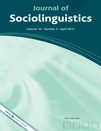
JOURNAL OF SOCIOLINGUISTICS
Exploring the Nexus of Language and SocietyThe Journal of Sociolinguistics, published by Wiley in the United Kingdom, is a leading interdisciplinary journal that explores the intricate relationships between language and society. With an impressive impact factor reflecting its Q1 quartile ranking in Histories and Philosophy of Science, Linguistics, Philosophy, and Sociology, this journal is recognized for its scholarly contributions, making it a vital resource for academics and practitioners in these dynamic fields. Covering a wide scope of topics from language variation and change to sociocultural dynamics, the journal has converged from 2004 to 2024, ensuring a comprehensive understanding of contemporary sociolinguistic issues. Although operating under a traditional access model, the Journal of Sociolinguistics remains pivotal for advancing critical dialogue and research for professionals, researchers, and students invested in linguistic and sociological studies.
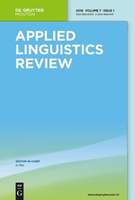
Applied Linguistics Review
Empowering dialogue in applied linguistics.Applied Linguistics Review is a leading academic journal published by WALTER DE GRUYTER GMBH, focusing on the dynamic field of linguistics and language studies. With an impressive Q1 quartile ranking in both Linguistics and Language and Social Sciences, the journal positions itself at the forefront of research, making it a crucial resource for scholars and professionals alike. The journal aims to foster scholarly dialogue by publishing high-quality, peer-reviewed articles that explore theoretical frameworks, empirical studies, and innovative methodologies in applied linguistics. Operating from Poland with an international reach, it is committed to advancing knowledge in areas such as language acquisition, language policy, and multilingualism. Its notable performance can be seen in its Scopus rankings, where it stands at #72 out of 1088 in the Arts and Humanities category and #86 out of 1167 in Social Sciences. The Applied Linguistics Review serves as an invaluable platform for researchers, educators, and students to disseminate and engage with cutting-edge research, thereby enhancing their understanding and application of linguistic principles in diverse contexts.
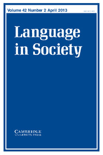
LANGUAGE IN SOCIETY
Connecting Linguistics with Societal ImpactLANGUAGE IN SOCIETY, published by Cambridge University Press, is a leading interdisciplinary journal that explores the intricate relationship between language and social factors. With an impressive track record since its inception in 1972, this journal has become a critical resource for researchers and practitioners in the fields of linguistics, sociology, and political science, as evidenced by its high ranking in both the Q1 quartile and Scopus percentile rankings. In 2023, it was placed within the top 94th percentile among its peers in language and linguistics and the 93rd percentile in sociology. Furthermore, LANGUAGE IN SOCIETY provides an insightful platform for understanding language as both a social practice and a key element of identity and power dynamics. Although it does not currently offer Open Access options, its rigorous peer-reviewed content remains essential for advancing scholarship and informing professional practice in the study of language in diverse societal contexts. With its scholarly contributions, LANGUAGE IN SOCIETY continues to shape discourse and foster academic collaboration across disciplines.
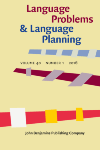
Language Problems & Language Planning
Unraveling the Threads of Communication and PlanningLanguage Problems & Language Planning is a pivotal scholarly journal published by John Benjamins Publishing Co, renowned for its contributions to the fields of linguistics, communication, and language studies. With an ISSN of 0272-2690 and an E-ISSN of 1569-9889, this journal has been a cornerstone of academic discourse since its inception in 1977 and will continue to serve as a vital resource until 2024. Currently, it holds a respectable position within the Q3 category in both Communication and Linguistics and Language, reflecting its significant impact in these areas. The journal focuses on the intersection of language-related challenges and planning, addressing critical issues that affect societies worldwide, making it essential reading for researchers, policymakers, and students alike. Although it does not offer Open Access options, its articles provide valuable insights supported by a rigorous peer-review process, fostering a diverse dialogue among scholars and practitioners. Recognized in the Scopus rankings, Language Problems & Language Planning offers a platform for original research and theoretical discussions that advance understanding of language issues in a globalized world.
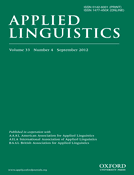
APPLIED LINGUISTICS
Elevating Academic Discourse in LinguisticsApplied Linguistics, published by Oxford University Press, is a premier scholarly journal that has significantly contributed to the fields of linguistics and communication since its inception in 1980. With an impressive impact factor and ranked in the top quartile (Q1) in both Communication and Linguistics and Language categories, Applied Linguistics is recognized for its rigorous peer-reviewed articles that explore the intersections of language, society, and cognition. The journal enjoys a remarkable position in the Scopus rankings, placing it among the top 2% of publications in its discipline. Researchers, professionals, and students benefit from its comprehensive scope, which encompasses innovative research on language acquisition, discourse analysis, and applied linguistics methodologies. Although not an open access journal, its commitment to advancing knowledge and fostering academic discussions makes it an indispensable resource for anyone interested in the critical role of language in various contexts.
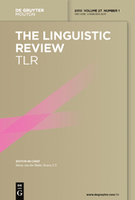
LINGUISTIC REVIEW
Exploring the Depths of Language and Meaning.LINGUISTIC REVIEW is a prestigious academic journal published by De Gruyter Mouton that has established itself as a leading platform in the field of Linguistics and Language. With an impressive impact factor and categorized in the Q1 Quartile for the year 2023, this journal ranks within the top tiers of its discipline, indicating its influential contributions to linguistic research. Covering an extensive range of topics from theoretical frameworks to applied linguistics, the journal aims to foster scholarly dialogue and advance the understanding of language in its myriad forms. Researchers and students alike will benefit from the rigorous peer-review process and the availability of in-depth studies published from 1981 onwards. While the journal is not open access, it is renowned for its exceptional quality and relevance in both the Arts and Humanities and Social Sciences classifications, with Scopus rankings placing it in the top percentile of its peers. By offering insight from leading scholars, LINGUISTIC REVIEW remains an indispensable resource for those who are passionate about linguistic inquiry and its real-world applications.

Slovo a Slovesnost
Cultivating Knowledge in the Heart of LanguageSlovo a Slovesnost is a prominent academic journal dedicated to the field of linguistics and language studies, published by the Czech Language Institute of the Czech Academy of Sciences. With an ISSN of 0037-7031, the journal has established itself as a significant resource for researchers and professionals within the linguistic community. Its rigorous selection process and impactful contributions have earned it a commendable Q2 ranking in Linguistics and Language as of 2023, as well as Scopus rankings in the 58th percentile for Language and Linguistics. Offering insights into both theoretical and applied linguistics, Slovo a Slovesnost serves as an essential platform for cutting-edge research, fostering dialogue among scholars, and enriching the study of language within the Czech Republic and beyond. Although it does not provide open access, the journal supports a subscription model that ensures high-quality dissemination of knowledge to a dedicated audience of linguists, educators, and linguistic scholars. With coverage converging from 2004 to 2024, it continues to thrive as a vital corner of linguistic scholarship.